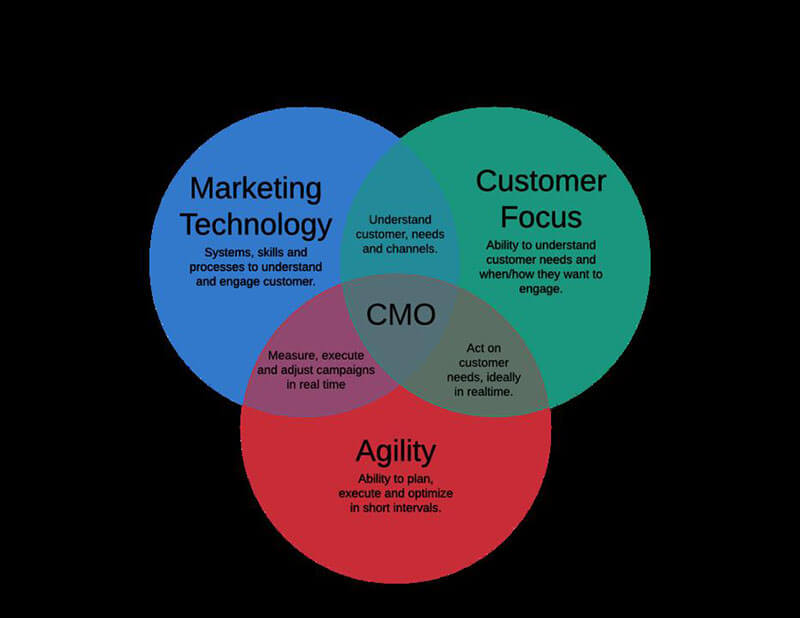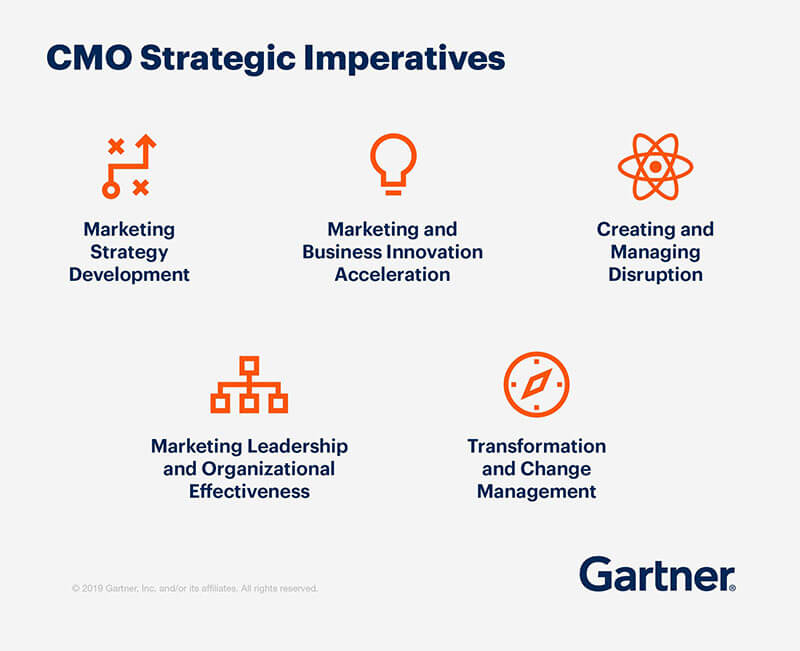How to Become a CMO: 5 Skills You Need to Master
Marketing professionals' roles within organizations have altered dramatically in recent years due to advanced technology, sophisticated data collection, and new marketing trends.

These shifts are most visible in the executive job of chief marketing officer. The marketing abilities required for success in this essential leadership post are diverse. But before everything else, let us first know who a CMO is. If your mind puts up a question, Who is a CMO? Here's the answer. A Chief Marketing Officer (CMO) is one of the numerous corporate executive positions known collectively as the "C-suite." A CMO is the highest-ranking marketing executive in an organization, responsible for managing marketing employees and developing and implementing the brand's marketing strategies. The CMO's primary goals are to increase sales and brand recognition.
Send a message to our business sales team below
You might be thinking, how much does a CMO earn? In the United States, the average income for a CMO is $224,548. The average increased cash remuneration for a CMO is $61,840.
So, what are the top qualities your CMO of the present and future must have for your team and organization to achieve maximum results? Marketing has changed dramatically in the last year. However, it has always been a fluid field, and a skilled Chief Marketing Officer (CMO) should be able to adapt to it. On certain occasions, these marketing professionals' strategies have been the deciding factor in whether or not a company succeeds.
5 CMO Skills That You Need to Master
Chief marketing officers are in this position because they have leadership qualities and technical marketing abilities. While CMOs have historically been required to be leaders, the future CMO must be able to bend and adapt to younger generations' shifting interests and work patterns. In most cases, CMOs today have management teams of older millennials who are in charge of entry-level employees just out of college. Millennials are digital natives, which means they have heightened expectations and reliance on technology for employment, communication, and creativity. The ability to align your communication and coaching techniques with what works effectively for this personnel is essential for flexible CMOs. Intranets, video conferencing, and other team project tools facilitate efficient workplace communication. Notably, the modern CMO must recognize that experienced individuals on their team are frequently quite tech-savvy and capable of incorporating digital technologies into marketing plans. We have outlined some qualities that every CMO needs for easy reference.

Source: https://www.linkedin.com/
1. Leadership
Leadership is vital in your role as a CMO. You provide the structure and motivation required to keep your team and marketing efforts on track. A successful leader leads by example; thus, being a dependable source of information and expertise is equally critical for your team's success.
2. Market Analysis
A brilliant CMO understands its market and is skilled at data research. Your tactics will never succeed if you don't know who your target market is, which is why any CMO must conduct research. You'll need to understand your customer's demands to connect with them and their preferences to interact with them effectively. These elements are critical for designing effective tactics.
Industry-Specific Email Lists
- Financial Services Email List
- Manufacturing Industry Email List
- Automotive Mailing Lists
- Retail Industry Email List
- Oil and Gas Mailing List
- Pharmaceutical Email Lists
- Transportation Mailing List
- Construction Industry Email List
- Education Industry Email List
- Food and Beverage Email List
- Hospitality Email List
Send a message to our sales team below
3. Adept at Innovation
The necessity for marketing officers to think creatively is intimately related to UX skill requirements and the executive leadership role. Customers and their behavioral data are significant input sources on company performance and future direction. This information puts the CMO in charge of discovering opportunities for product, service, and process additions, deletions, or alterations. The CMO searches for evidence that client approaches and desires have altered while monitoring and enhancing the UX. If your organization can put solutions in place during peak demand and adjust purchasing routes to meet market preferences faster than anyone else, you can cement your market leadership position.
4. Technical Expertise
You cannot succeed as a marketing officer in today's company environment unless you go beyond the standard marketing competencies list and include good technical ability and knowledge of technology. Marketing teams consist of diverse specialists with expertise in web programming, business intelligence, content generation, and digital media buying. The CMO must understand how this personnel interacts to lead and participate in internal strategy debates. Approximately half of all marketing positions demand technological abilities, and marketing directors face a significant skills gap.
Job Title Specific Email List
Send a message to our sales team below
5. Strategic Planning and Vision
The CMO's function has also grown in importance within the top management team. Marketing has evolved into an essential driving element in advancing firm growth strategies. As a result, the chief marketing officer must be a visionary who can assist the executive team in making marketing decisions based on possibilities and obstacles. Customer and user experiences are vital to gain and maintain customers. As a result, marketing plays a significant role in facilitating digital operations and incorporating digital marketing techniques into them. Vision and strategic planning are inextricably linked. Top CMOs have a veritable crystal ball in their ability to identify market trends and patterns before they manifest.
But above all, the most necessary is Being Human. In today's remote world, being "human" is more crucial than ever. The CMOS are typically in charge of their company's brand; thus, developing and maintaining their company's human approach to business, whether B2B or B2C, should always be their top concern. Throughout the pandemic, some companies prospered well, and others struggled hard. Those organizations who were value-based and honest are thriving as they respond to their customers and make their demand to be heard.
How to become a CMO?
You need some specific education and experience to become a CMO. Many influential CMOs begin their careers as entry-level marketers before becoming marketing directors or chief marketing officers. A marketing degree can be advantageous in the post of Chief Marketing Officer, or CMO, although it is not required. An MBA with a marketing concentration is typically needed for a CMO. Some universities offer master's degrees in marketing. The program should teach you about business growth and budgeting. You should be well-versed in target audiences and buyer psychology. It should also include elements of advertising and branding.

Source: https://www.getsmarter.com/
Some marketers may specialize in paid advertising, public relations, e-commerce, SEO, or copywriting. This can give them an advantage, depending on the business and market. A CMO for a smaller company or a startup may find that their skills are necessary for plan implementation rather than just strategy design. In most circumstances, experience will be required to obtain a position as CMO. A corporation may need between three and ten years of experience. CMOs with 15-20 years of experience are likelier to earn more than new CMOs.
However, according to a study by Forbes Insights, only 35% of current CMOs had a background in "marketing." So, even if you discover this ambition later in the game, you still have time to expand your knowledge and expertise.
What role do they play in the companies?
1. The CMO directs the company's strategy
Customers are not loyal; they rush to offerings that make their lives easier and better. In this case, the CMO's function is distinct because the CMO knows the customer like no other executive. And the individual who knows the customer must eventually change the corporate strategy because organizations that stress over customer behavior incur losses.
Recent Marketing Articles
- Generate Business Sales Leads With These Tips
- B2B Sales Leads: The 7 Best Ways to Generate More Business Leads
- How ChatGPT Will Affect The Future Of SEO?
- How to Spend Your 2023 Marketing Budget: 5 Ways to Succeed This Year
- 10 Must-Know Tips for Marketing Your Law Firm In 2023
- How Buying B2B Data Helps To Close More Deals?
- 10 Tools That Actually Close More Deals
- How To Find Someone's Email Address: 5 Simple Ways
- Everything You Need To Know About Lead Management
- How To Buy Leads? Complete Guide On What To Avoid
- How To Take Your Email Campaign To The Next Level?
- Top 5 Intent Data Providers To Increase Your Sales
2. The CMO presents the Board with a Future Vision.
In the future, the CMO will play a more significant role in influencing the Board. After all, the CMO has its finger on the customer's pulse. If a corporation excludes the CMO from board-level discussions, it does not appreciate the value of the marketing category.
3. CMO: The Master Of Personalization
It's difficult for us to consider what personalization means today, let alone personalization in the future. Personalization today primarily refers to adverts generated by online product searches. Personalization will be a mainstay of every competitive customer experience in the future, and the CMO will make it happen.
4. The CMO curates content in collaboration with its customers.
Customer communication is no longer a one-way highway for today's firms. Customers are talking to businesses and want to be heard. The ability of brands to scale the listening process is a challenge. The technology discussed above, namely machine learning, will assist businesses in becoming better listeners. We already know social media is powerful and will soon be referred to simply as media. Customers want to recognize themselves in your brand. Today's CMOs must take the process of co-creating content with customers seriously.
5. The CMO is in charge of innovation and transformation
The CMO is responsible for leading digital changes; as technology aids more customer experiences, creating that experience becomes increasingly important. The ability of a corporation to digitally transition will determine its success.
Conclusion
This list of top CMO abilities clearly shows the role's complexity and diversity in today's marketing contexts. One of the most notable examples is the increased emphasis on technical expertise and analytics, which have become critical elements in driving more business. CMOs requires a wide range of talents to guide millennials through the creation and execution of marketing campaigns in the digital age.
Few people are exceptional at everything. The finest leaders surround themselves with people who can supplement their present skills while outperforming them in other areas. Being able to do both is what truly defines a CMO.
CMOs require a plan to set the tone for their tenure to accomplish everything that needs to be done as a CMO, from prioritizing to aligning with the CEO to communicating with consumers, reviewing your team, outlining your priorities, cultivating critical relationships, and demonstrating rapid successes.
Our customer satisfaction ratings

5 / 5

4.4 / 5

4.6 / 5





